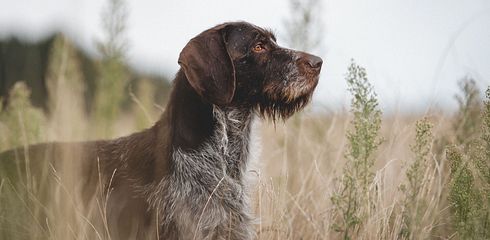Food poisoning is a common problem in dogs and can even be fatal. Chocolate is known to be toxic to dogs, but there are other foods that many people are unaware are poisonous to dogs. We at GUNFINDER have compiled the top 10 most toxic foods for dogs to educate pet owners about the precautions they should take to avoid poisoning. It is important for dog owners to know which foods can be dangerous for their four-legged friends to ensure that their beloved dogs stay healthy.
Dog Killer Avocado
Avocado is toxic to dogs because it contains persin, a toxic fatty acid that is harmless to humans but can cause health problems in dogs. Both the pit and the flesh of the avocado are dangerous for dogs. The pit can lead to a fatal intestinal blockage, while the fatty flesh can cause diarrhea in sensitive dogs. In high doses, persin can also cause pancreatitis and myocardial degeneration (heart muscle destruction). It is important for dog owners to remember to keep avocados away from their dogs.

Alcohol - Highly Toxic to Dogs
Warning! Alcohol is extremely dangerous for dogs and can even be fatal. A small sip of alcohol is enough to trigger intolerance or poisoning reactions in dogs. Therefore, always keep your dog away from alcoholic beverages and ensure that they do not have access to them - for example, when you are at a party or grilling in the park. Symptoms of alcohol poisoning in dogs can include nausea, vomiting, and coordination problems. In severe cases, it can also lead to shortness of breath and coma, which can ultimately be fatal. So always be very careful and pay attention to your dog's safety!

Raw Yeast Dough
Yeast dough should never be fed raw to dogs, as it can be dangerous for them. When the dough enters the dog's stomach, the fermenting yeast provides ideal conditions for reproduction. The walls of the stomach can expand significantly due to the formation of carbon dioxide from starch and sugar. It can be difficult to vomit due to the sticky, fermenting dough mass. If the growing yeast dough also presses on the diaphragm, breathing problems can occur. Small dogs like Yorkshire Terriers are particularly at risk.
Feeding Ban: Pork
It is important to know that pork can be contaminated with herpes viruses that can be dangerous to dogs. It is recommended to only feed cooked pork to dogs, as herpes viruses can cause inflammation of the brain and spinal cord, which can lead to death. Hunting dogs may be particularly at risk as they may come into contact with infected wild boar meat. Even small doses of herpes viruses can be toxic to dogs. Symptoms of poisoning include inflammation of the brain and spinal cord, and death can occur within two days after the onset of symptoms.
Raisins and Grapes Are Poisonous to Dogs
It is important to know that grapes and raisins are toxic to dogs and other pets, although the exact cause is still unknown. A genetic predisposition is being discussed as a possible explanation. Symptoms of poisoning can include diarrhea, vomiting, reduced urination, and pain. In severe cases, it can lead to dramatic kidney damage and even death. Therefore, dogs should never be given grapes or raisins.

Hidden Danger: Birch Sugar (Xylitol)
Warning: Xylitol, also known as birch sugar, is increasingly found in candies, sugar-free gum, and reduced-calorie spreads like jam or peanut butter. It can also be present in dietary foods for diabetics such as pastries, chocolate, or desserts. Even homeopathic globules are sometimes sweetened with xylitol. It is extremely important for dog owners to know that xylitol is toxic to dogs and even small doses can cause serious side effects. A toxic dose is considered to be 0.1 grams of xylitol per kilogram of body weight. This means that just 1.5 pieces of gum containing 0.3 grams of xylitol can be fatal for a 5-kilogram dog. It is equally dangerous if a dog eats just five xylitol-sweetened globules. Symptoms of intoxication can occur within 20 minutes to an hour and include diarrhea, vomiting, weakness, and an unsteady, stumbling gait, as well as rapid heartbeat, trembling, and seizures. In extremely high doses, loss of consciousness and liver failure can occur.
Chocolate and Cocoa
Chocolate is toxic to dogs and can lead to heart problems. The toxic ingredient theobromine is particularly high in cocoa and thus in dark chocolate. Even 7 grams of dark chocolate per kilogram of dog weight can trigger poisoning reactions. Milk chocolate and white chocolate are less dangerous but can still cause lactose intolerance and cavities in dogs. Symptoms of poisoning include vomiting, diarrhea, seizures, rapid heartbeat, and epileptic seizures. In the worst case, death can occur due to heart failure.

Caffeinated Beverages
Caffeine is one of the most toxic substances for dogs and comes in various forms, such as coffee, tea, soft drinks, energy drinks, chocolate, and candies. Dark chocolate is particularly risky as it also contains theobromine, which is also toxic to dogs. Caffeine can be fatal at a dose of 150 mg per kilogram of body weight. Symptoms of caffeine poisoning in dogs include restlessness, panting, vomiting, abdominal pain, diarrhea, seizures, coordination problems, fever, trembling, and arrhythmias. In severe cases, death from heart failure can occur within a day.

Garlic and Onions Are Taboo!
Please do not give your dog onions or other onion plants such as leeks, shallots, garlic, or chives. These foods can lead to hemolysis, a breakdown of red blood cells. Even a medium-sized raw onion (about 200 g) can be toxic to medium-sized dog breeds if they consume more than 5 grams per kilogram of body weight. Symptoms of poisoning include digestive disorders such as vomiting and diarrhea, loss of appetite, bloody urine, and weakness, as well as increased respiratory and heart rate. In severe cases, these symptoms can even be fatal. Therefore, please ensure that your dog does not get any onions or other onion plants.

Beware of Nuts!
Please note our friendly reminder that various types of nuts can be harmful to your furry friend. These include walnuts, macadamia nuts, hazelnuts, almonds, Brazil nuts, pistachios, and peanuts. With walnuts, the moldy fruit husk can be dangerous, while the cause for macadamia nuts is unknown. It is best to keep all types of nuts away from your dog to be safe. Symptoms of poisoning can include diarrhea, vomiting, seizures, apathy, increased body temperature, digestive disorders, muscle tremors, stiffness, weakness of the limbs, and breathing problems. Watch for these signs and ensure your dog's safety!





























